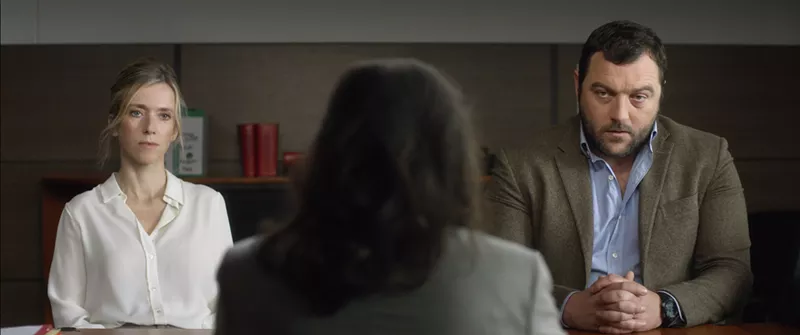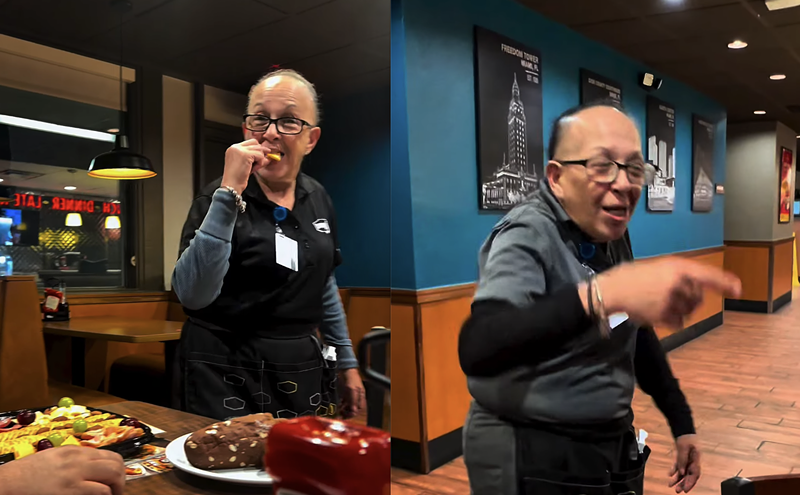Xavier Legrand’s Custody opens with an estranged married couple presenting before a judge (Saadia Bentaieb) dressed in neutral white their respective arguments about who should care for their youngest child. Miriam (Léa Drucker) has quit her job and absconded with the family’s two kids — 11-year-old Julien (Thomas Gioria) and almost-18 Josephine (Mathilde Auneveux) — after, she explains, experiences of spousal and child abuse.
In the telling of Antoine (Denis Ménochet), however, his purportedly aggressive behavior is as right as rain: What father worth his salt wouldn’t wait outside in his car all night for a chance at seeing the son who has been removed from his daily life? As for the abuse allegations regarding a years-ago injury to Josephine, Antoine calmly counters: “She sprained her wrist at gym. What can I say?” Legrand, who both wrote and directed Custody, unfolds the 15-minute negotiation with riveting impartiality, placing the audience firmly in the shoes of Bentaieb’s unsmiling arbitrator. Neither musical cues nor behavioral detail telegraph which parent is, in the judge’s wording, “the bigger liar.” The only suggestions of authorial judgment arrive when the participants in this legal process go too far with their embellishments — as when Antoine’s counsel confidently but ridiculously strains to clarify that her client’s colleagues consider him “a nature lover who doesn’t drink.”
From there, Legrand continues this dance of ambiguity, keeping us in doubt for approximately half of the 93-minute Custody. (Viewers of Legrand’s companion piece, the 2013 Academy Award–nominated short Just Before Losing Everything, will, however, be privy to the truth of the situation from the get-go; consider this a light spoiler warning.) Antoine emerges from the hearing with privileges to pick up Julien for occasional weekend visitations. Ménochet uses his considerable frame — he at times hulks along, James Gandolfini-style — to suggest both of the story’s possibilities. Seen in one light, his Antoine appears a bitter brute, indignant at his wife and using his child as a pawn in their feud; in another, a source of gentle-giant tenderness, inquiring, “So I hear you’re sick?” after kissing Julien on the forehead. Eschewing orchestral accompaniment, Legrand skillfully locates tension in these driving scenes in the most mundane of noises: a turn signal, a seatbelt alarm. (The sound work is credited to Julien Sicart, Vincent Verdoux and Julien Roig.) The car rides to and from Antoine’s parents’ home, where father and son are greeted with friendly company and warm meals, are charged with anxiety. Jean-Marie Winling and Martine Vandeville are remarkable in their mini-roles as Antoine’s parents. Their every stab at preserving normalcy for their son and grandson, whether through idle banter or hearty meals, lands with a quietly thunderous desperation.
Custody replicates the achievement of Just Before Losing Everything, in that Legrand has again taken an under-treated subject matter — domestic violence and the systems that perpetuate it — and rendered it vivid via a fascination for cinematic duration. Just Before Losing Everything takes place predominantly in a department store and proceeds generally in real-time fashion. Custody’s final half-hour consists mostly of two scenes: a “Proud Mary”–scored birthday party for Josephine, much of which transpires in roving long takes; and a wrenching, beat-by-beat home-invasion sequence, in which Miriam and Julien cower in the bathtub and wait for the authorities.
Legrand demonstrates great skill as a tactician in this closing third, but his overarching framework for Custody — with its considerable reliance on is-he-or-isn’t-he uncertainty — demands that he sacrifice interior perspectives. When Miriam says to Antoine, in one parking-lot argument, that she “won’t talk about the same old stuff,” the line rings hollow, as that “same old stuff” hasn’t been unpacked for anyone but them. The most talkative scene in the movie is the first, where what’s true is up in the air; later, when everyone’s cards are on the table, the prevailing mode shifts to a dialogue-light, high-intensity action. It’s a curious dichotomy that impresses on a directorial level even as it hedges on a psychological one.

Audio By Carbonatix
[
{
"name": "GPT - Billboard - Slot Inline - Content - Labeled - No Desktop",
"component": "22004575",
"insertPoint": "2",
"requiredCountToDisplay": "2"
},{
"name": "STN Player - Float - Mobile Only ",
"component": "22595215",
"insertPoint": "2",
"requiredCountToDisplay": "2"
},{
"name": "Editor Picks",
"component": "17482312",
"insertPoint": "4",
"requiredCountToDisplay": "1"
},{
"name": "Inline Links",
"component": "18711090",
"insertPoint": "8th",
"startingPoint": 8,
"requiredCountToDisplay": "7",
"maxInsertions": 25
},{
"name": "GPT - 2x Rectangles Desktop, Tower on Mobile - Labeled",
"component": "23181625",
"insertPoint": "8th",
"startingPoint": 8,
"requiredCountToDisplay": "7",
"maxInsertions": 25
},{
"name": "Inline Links",
"component": "18711090",
"insertPoint": "8th",
"startingPoint": 12,
"requiredCountToDisplay": "11",
"maxInsertions": 25
},{
"name": "GPT - Leaderboard to Tower - Slot Auto-select - Labeled",
"component": "17720761",
"insertPoint": "8th",
"startingPoint": 12,
"requiredCountToDisplay": "11",
"maxInsertions": 25
}
]








